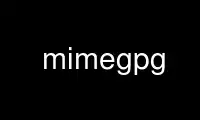
This is the command mimegpg that can be run in the OnWorks free hosting provider using one of our multiple free online workstations such as Ubuntu Online, Fedora Online, Windows online emulator or MAC OS online emulator
PROGRAM:
NAME
mimegpg - MIME-GPG utility
SYNOPSIS
mimegpg [-s] [-E] [-e] [-c] [-d] [-p n] {--} {gpg options...}
DESCRIPTION
The mimegpg tool signs, encrypts, or decrypts MIME-formatted E-mail messages using GnuPG.
mimegpg does not contain any encryption code. It uses the GnuPG utility for all encryption
and decryption functions.
The -s option signs an E-mail message. The -E or the -e option encrypts the E-mail
message. Specifying both -E/-e and -s encrypts and signs the E-mail message in a single
step. The -d option decrypts the message. The -c option checks signatures.
mimegpg works as a filter. It reads an E-mail message from standard input, which must be a
MIME-formatted message. mimegpg signs, encrypts, and/or decrypts the message; then writes
the encrypted, signed, or decrypted MIME message on standard output.
The standard input to mimegpg must be a MIME E-mail message, with a "Mime Version: 1.0"
header - even if the message does not contain any attachments. If the message contains any
attachments, they are also signed and/or encrypted, individually.
mimegpg automatically runs GnuPG, with the required options. mimegpg´s options may also
be followed by a single -- option; any remaining command line options are passed as
additional options to GnuPG. The -E/-e option usually requires at least one -r GnuPG
option, which may be specified in this fashion.
The -p option specifies a file descriptor that contains any required passphrase. Any other
valid GnuPG options may follow a double-dash, "--", as long as it makes sense for this
operation (note that mimegpg automatically adds any GnuPG options that are needed to
perform the given operation). The "--no-tty" option can be useful when mimegpg is used in
a non-interactive mode. As always, secret keys that are password-protected secret keys
cannot be used in the --no-tty mode, unless the -p option is used.
SIGNING AND ENCRYPTING MESSAGES
Use the -s option to sign MIME message content. Use the -E option to encrypt it. Use both
options to both sign and encrypt. Follow with --, then any other GnuPG options. The -E
option will require at least one -r GnuPG option.
The -E option encapsulates the message content and all the attachments into a single
encrypted MIME object. Some mail software cannot handle encapsulated content. The -e
option encrypts each attachment separately, without encapsulation.
If a secret key used for signing is password protected, the prompt to enter the password
will be issued directly by GnuPG. Note that the -s and the -e (but not -E) options may
issue multiple password prompts in interactive mode. mimegpg runs GnuPG multiple times if
the MIME message contains attachments. GnuPG will be invoked separately for each
attachment in the MIME message, and each invocation will prompt for any required key
password. Note that the initial message headers are not signed and/or encrypted, except
for the MIME headers themselves. However, any message/rfc822 MIME content - attached
messages - are encrypted/signed in their entirety, headers and content.
DECRYPTING AND CHECKING SIGNATURES
The -d option attempts to decrypt any encrypted content in a MIME message. The -c option
attempts to verify signatures of any signed content. Both -c and -d can be specified at
the same time. -d looks for any multipart/encrypted MIME content, then attempts to
decrypt it. -c looks for any multipart/signed MIME content, then attempts to verify the
signature.
The -c and -d options replace the multipart/signed and multipart/encrypted MIME content
with a multipart/x-mimepgp section, that contains an additional attribute called
"xpgpstatus". The value of the attribute is set to the exit code of GnuPG. Succesfully
decrypting the message and/or verifying the signature sets the exit code to 0. A non-zero
exit code indicates that the signature could not be verified, or the message could not be
decrypted.
The first section in this multipart/x-mimepgp is a text/plain section that contains any
messages from GnuPG. The second section is any decrypted or signed content. mimegpg will
include the signed content even if the signature could not be verified (check xpgpstatus).
Encrypted content that could not be decrypted will not be included (obviously).
Note - any existing x-mimegpg MIME section will have its content-type quietly reset to
multipart/mixed, in order to avoid confusion (except when this is what got decrypted).
Use mimegpg online using onworks.net services